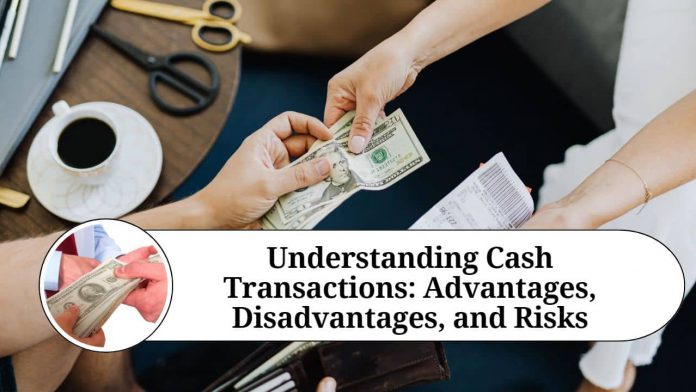INTRODUCTION
Cash transactions are the exchange of physical currency or cash between two parties to complete a purchase or payment. It is the most common form of payment used in day-to-day transactions, especially for small amounts. Cash transactions have been a part of the economy since the inception of money and have been the primary mode of payment for centuries.
Cash transactions are usually initiated by a buyer who hands over the cash to the seller in exchange for goods or services. In some cases, a receipt may be issued to the buyer as proof of payment. Cash transactions can take place in various settings, including marketplaces, stores, and homes.
One of the advantages of cash transactions is the simplicity and convenience they offer. Both parties can complete the transaction without the need for complicated payment systems or third-party intermediaries. Cash transactions are also instant, meaning that once the payment is made, the seller has immediate access to the funds.
However, cash transactions also come with some disadvantages. For one, carrying large sums of cash can be risky, making both the buyer and seller vulnerable to theft or robbery. Cash transactions also do not offer the same level of protection as other forms of payment, such as credit cards or online payment systems.
Another drawback of cash transactions is that they do not leave a clear trail of the transaction, making it challenging to keep track of the payments made. This can create difficulties for businesses when it comes to accounting and record-keeping.
In some cases, governments may also impose limits or restrictions on cash transactions to combat money laundering, tax evasion, or other illegal activities. For example, in some countries, cash transactions above a certain amount may require the parties to report the transaction to the government.
Cash transactions are still prevalent today, even though more advanced forms of payment are available. Cash remains a popular option for transactions involving small amounts, such as buying groceries or paying for a cup of coffee. It is also the preferred mode of payment in many developing countries where access to electronic payment systems is limited.
Despite the risks associated with carrying cash, some people still prefer this form of payment because it allows them to stay within their budget and avoid the temptation of overspending with credit cards. Others may also prefer cash transactions because they value the anonymity it provides, as it does not leave a paper trail.
In recent years, there has been a shift towards contactless payments, which use near-field communication (NFC) technology to make payments without physical contact. These payments can be made using smartphones, smartwatches, or even debit and credit cards with NFC technology.
While contactless payments offer many benefits, such as speed and convenience, they have also raised concerns about security and privacy. Hackers can intercept the data transmitted during contactless transactions, making them vulnerable to fraud and identity theft.
To address these concerns, many contactless payment systems now incorporate additional security features such as biometric authentication, which uses fingerprints or facial recognition to confirm the user’s identity. They also use encryption technology to protect sensitive data transmitted during the transaction.
Conclusion
In conclusion, cash transactions are a familiar and straightforward way of completing payments. While they have some drawbacks, they remain popular, especially for small transactions. However, the rise of contactless payments provides consumers with more options and convenience. Regardless of the form of payment used, it is crucial to prioritize safety and security when conducting financial transactions.
Other Related Blogs: Section 144B Income Tax Act
Frequently Asked Questions (FAQs)
Q: What is a cash transaction?
A: A cash transaction is an exchange of physical currency or cash between two parties to complete a purchase or payment.
Q: What are the advantages of cash transactions?
A: Cash transactions are simple, convenient, and immediate. Both parties can complete the transaction without the need for complicated payment systems or third-party intermediaries.
Q: What are the disadvantages of cash transactions?
A: Carrying large sums of cash can be risky, making both the buyer and seller vulnerable to theft or robbery. Cash transactions also do not offer the same level of protection as other forms of payment, such as credit cards or online payment systems. Additionally, it can be challenging to keep track of the payments made.
Q: What are the risks associated with cash transactions?
A: Cash transactions can be risky because they provide no protection against fraud or identity theft. Also, cash is easily lost or stolen, which can be a significant inconvenience.
Q: How do cash transactions compare to electronic payments?
A: Cash transactions are simple and immediate, but they do not provide the same level of protection as electronic payments. Electronic payments, such as credit cards and online payment systems, are more secure and leave a clear trail of the transaction.
Q: What are contactless payments?
A: Contactless payments use near-field communication (NFC) technology to make payments without physical contact. These payments can be made using smartphones, smartwatches, or even debit and credit cards with NFC technology.
Q: Are contactless payments safe?
A: Contactless payments are generally safe, but they do pose some security risks. Hackers can intercept the data transmitted during contactless transactions, making them vulnerable to fraud and identity theft. However, many contactless payment systems now incorporate additional security features to protect users’ sensitive data.
Q.What are some examples of contactless payment systems?
A: Some examples of contactless payment systems include Apple Pay, Google Pay, Samsung Pay, and contactless credit and debit cards.




















